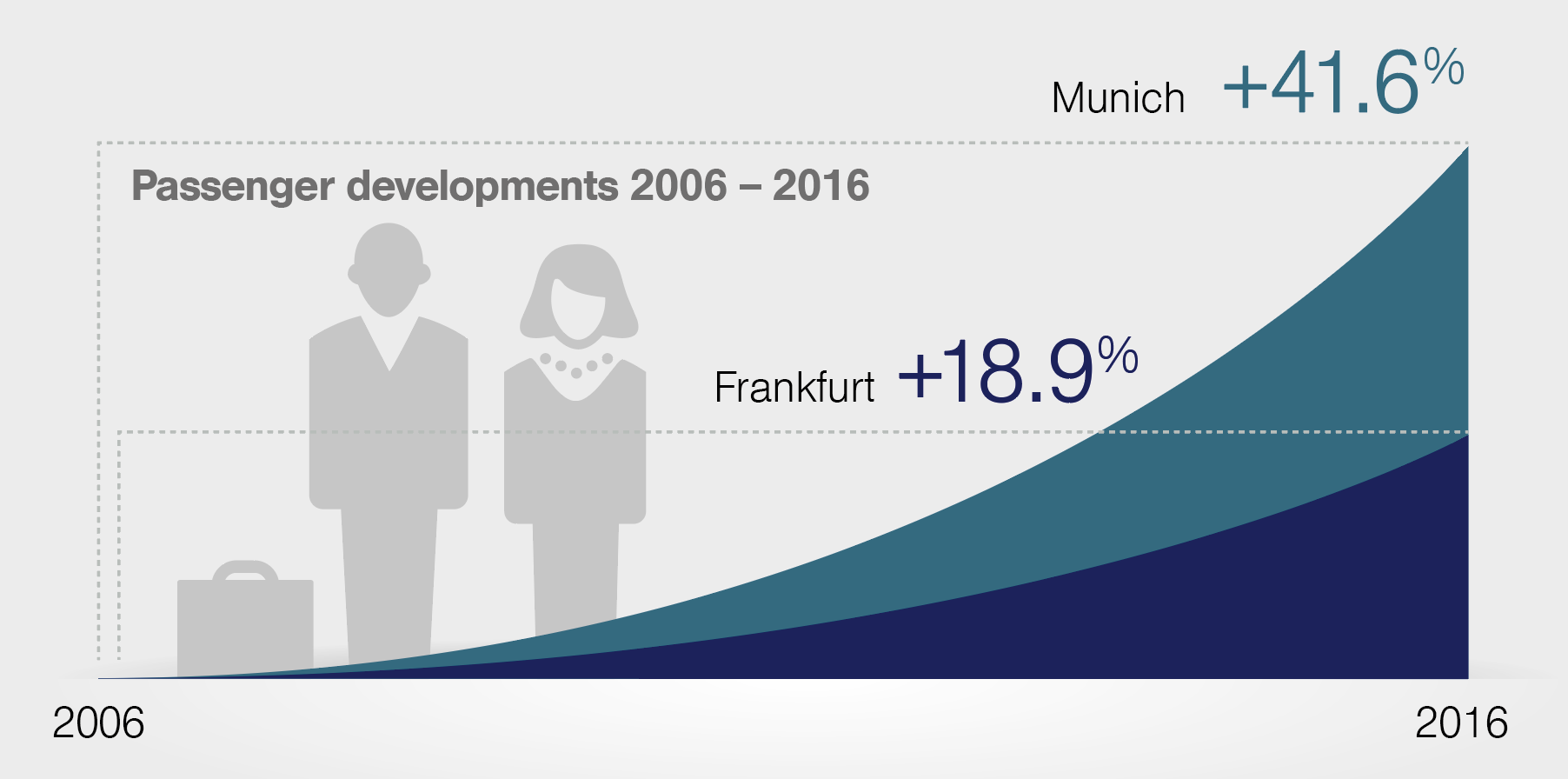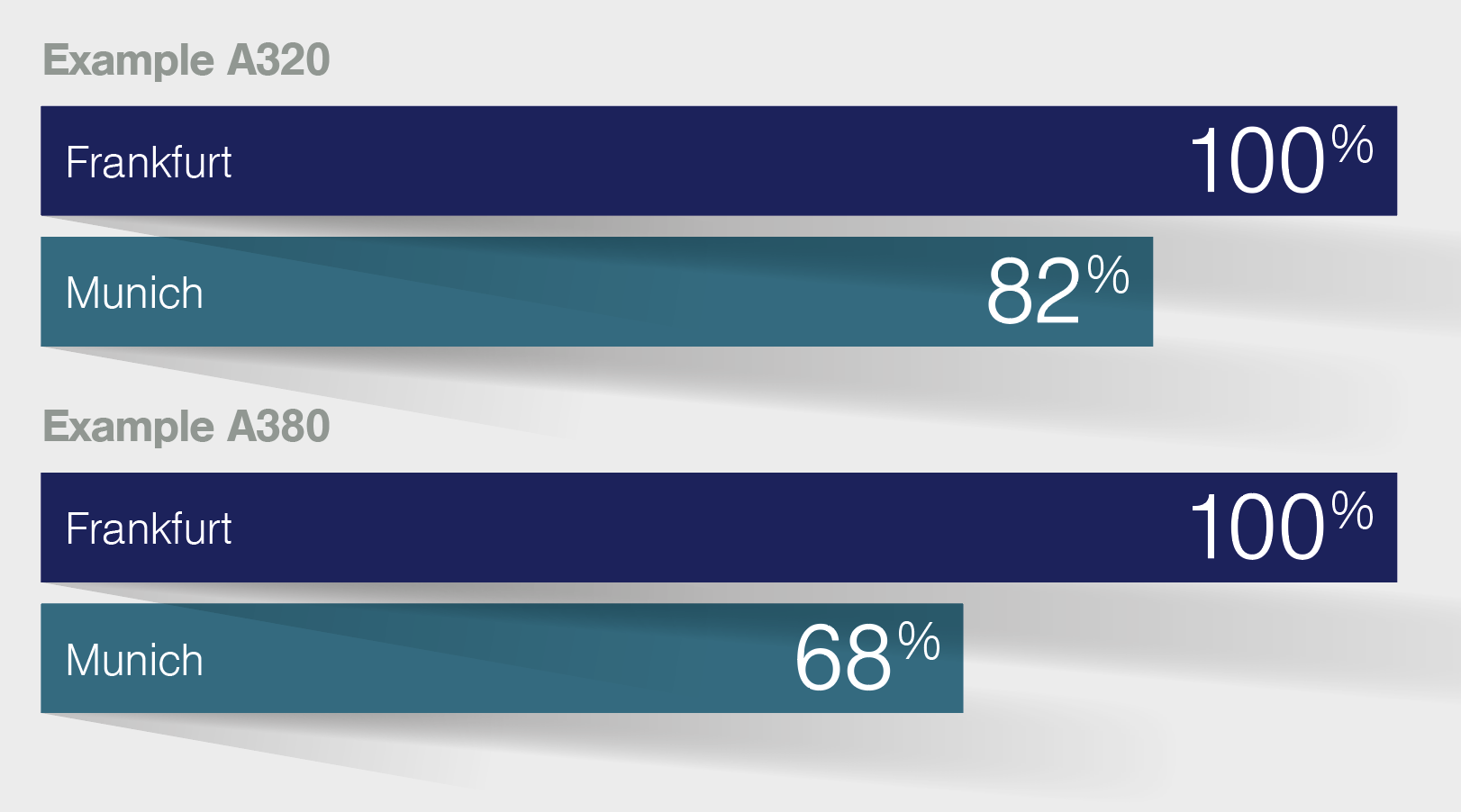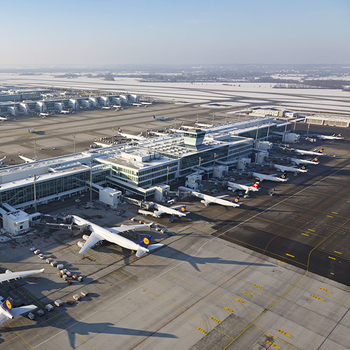Location
Frankfurt:
Working together to restore the hub’s leading position
Frankfurt Airport has been experiencing below-average growth for years. There are two main reasons for this: Growth-inhibiting framework conditions and a lacking joint strategy between the Lufthansa Group, as main customer, and airport operator Fraport. The much heralded system partnership must be revived with new ideas and clear commitment from all parties involved.
Munich Airport grows at double the rate of Frankfurt
The number of departing passengers in Munich rose by 3.5 percent per year to 21.1 million between 2006 and 2016. In Frankfurt, growth was recorded at 1.7 percent. 30.2 million travellers took off from FRA in 2016. Passenger developments 2006 – 2016

Munich Airport grows at double the rate of Frankfurt
The number of departing passengers in Munich rose by 3.5 percent per year to 21.1 million between 2006 and 2016. In Frankfurt, growth was recorded at 1.7 percent. 30.2 million travellers took off from FRA in 2016. Passenger developments 2006 – 2016

Integrated co-operation a success factor
All around the world, we are seeing major network airlines co-operating more and more intensively with their home hubs: Atlanta and Delta Airlines, Istanbul and Turkish Airlines, as well as Amsterdam, Paris and Air France/KLM. Germany also has its own positive example with Munich and the Lufthansa Group. The partners have worked together to develop Terminal 2, which processes all customers of Lufthansa and Star Alliance partners, as a transit terminal, finance it, and operate it for 14 years. In 2016, the terminal was expanded to include a new building with a capacity of eleven million passengers, costing around 700 million euros. Both companies have a 60 percent (FMG) and 40 percent (LH) share in T2 GmbH respectively, making them true system partners.
The aim of airlines and airport operators is to jointly recognize passenger wishes. Terminal 2 lives off this, and is tailored precisely to guest needs and expectations. Munich boasts short distances, both to gates and the numerous Lufthansa lounges. And transit time is an outstanding 40 minutes. Guests can use the saved time wisely: it’s all about “visitor attractiveness”. So it is no coincidence that Terminal 2 was named the world’s best terminal at the Skytrax World Airport Awards – the “Oscars” for airports – in March. And the airport overall as number one in Europe.
Munich Airport grows at double the rate of Frankfurt
The number of departing passengers in Munich rose by 3.5 percent per year to 21.1 million between 2006 and 2016. In Frankfurt, growth was recorded at 1.7 percent. 30.2 million travellers took off from FRA in 2016. Passenger developments 2006 – 2016

Munich Airport grows at double the rate of Frankfurt
The number of departing passengers in Munich rose by 3.5 percent per year to 21.1 million between 2006 and 2016. In Frankfurt, growth was recorded at 1.7 percent. 30.2 million travellers took off from FRA in 2016. Passenger developments 2006 – 2016

Developing joint business models
Munich has shown that a lot can be achieved when working together. What’s on the agenda for a real system partnership in Frankfurt now?
- Joint sources of revenue: Leases and rentals at the airport are playing an increasingly important role in financing aviation. Lufthansa wants to contribute its know-how to increase income – for the benefit of the airport and the airline.
- Joint growth strategy:Lufthansa wants to keep growing in Frankfurt. But that can only be done in co-operation with Fraport – jeopardizing transit quality by making dumping offers to competitors is counterproductive.
- Joint quality standards: Travellers departing from Germany have access to numerous hubs, enabling them to fly all over the world. Airport quality is a key criterion – Lufthansa and Fraport must increasingly tackle the future together here.
Press release
Munich Airport and Lufthansa report excellent results
In the first year, the new satellite building at Munich Airport has handled more than 74,000 flights and welcomed around nine million passengers. As joint venture partners, the airport operating company and Lufthansa are reporting excellent results.

